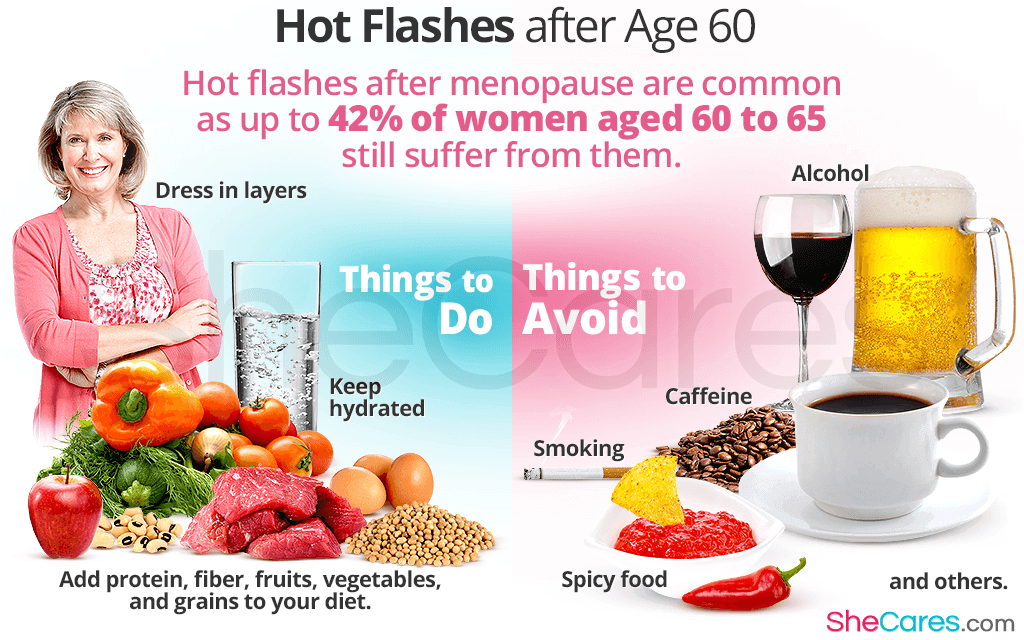While they can be truly bothersome, hot flashes after 60 are not uncommon. Nevertheless, they can still leave many middle-aged women wondering if they will ever break free from this hallmark menopause symptom. Luckily, with the right tools, hot flashes after menopause can soon be a thing of the past.
Read on to learn more about hot flashes in your 60s, including what they are, how long they will last, what causes them, how to cope with them, and what are the best ways to treat them with ease.
How Common Are Hot Flashes after 60?
Hot flashes - sensations of intense heat in the upper part of the body - are most commonly experienced in a woman's mid-40s during the perimenopausal stage of the menopausal transition.
However, studies have shown that 42% of women between the ages of 60 to 65 still suffer from hot flashes, with 6% of them rating them as moderate to severe.1
How Long do Hot Flashes Last After Menopause?
Because each woman's menopausal transition is different, there is no way to determine if and for how long will her hot flashes last once she enters postmenopause.
Generally, in women who had their first hot flashes before their last menstrual cycle, the symptom has been shown to last for an average of 9 to 10 years, which means it could extend well into the early 60s since the average age of menopause is 51. Those who had their first hot flashes after their last periods tend to suffer from them for three and a half years.2
What Causes Hot Flashes after Age 60?
Similarly to hot flashes that occur earlier on in the menopausal transition, hot flashes after 60 are mainly due to hormonal imbalance, namely decreased estrogen.
A decline in estrogen levels deregulates the hypothalamus, the part of the brain responsible for controlling body temperature. A false signal that temperature increased triggers a cooling mechanism, resulting in what it is referred to as a hot flash.
Additionally, there are a number of known triggers for hot flashes over 60, which include spicy food, hot drinks, alcoholic beverages, stress, hot weather, and tobacco, among others.
How Can I Cope with Hot Flashes after 60?
The best way to beat hot flashes after menopause is by tackling them naturally. While the symptom is closely related to estrogen decline in the body, other factors can also cause the body's temperature control to deregulate.
Luckily, by following simple recommendations on the things to do and avoid, women can reduce the intensity and frequency of hot flashes after 60.
Things to Avoid for Hot Flashes over 60
- Hot showers
- Caffeine
- Spicy food
- Hot beverages
- Alcohol
- Smoking
- Stress
- Warm environments
- Weight loss supplements
Also, women struggling with hot flashes at 60 and beyond are encouraged to avoid wearing synthetic or tight clothing.
Things to Do for Hot Flashes over 60
- Eating a diet rich in protein, fiber, whole grains, fruits, and vegetables
- Exercising regularly
- Staying well hydrated
- Reducing stress with deep breathing exercises or meditation
- Using a mini portable hand fan
- Dressing in breathable, layered clothing
- Taking natural supplements
How to Treat Hot Flashes after 60?
While pharmacological treatment for hot flashes after 60, including hormone-replacement therapy (HRT), has been the go-to approach for years, women are nowadays more inclined to consider less risky and more natural treatments to avoid the serious health risks associated with HRT, such as breast and ovarian cancer; blood clots; and others.
Some of the best natural ways to treat hot flashes at 60 and beyond include herbal supplements, such as phytoestrogenic supplements and hormone-balancing supplements, which address the underlying hormonal imbalance behind this pesky symptom.
Discover more about the most effective natural remedies for hot flashes and put a concrete step towards finding well-deserved reprieve.
Sources
- Harvard Medical School. (2015). Menopause-related hot flashes and night sweats can last for years. Retrieved October 21, 2019 from https://www.health.harvard.edu/blog/menopause-related-hot-flashes-night-sweats-can-last-years-201502237745
- JAMA. (2008). Persistent Hot Flushes in Older Postmenopausal Women. Retrieved October 21, 2019 from https://jamanetwork.com/journals/jamainternalmedicine/fullarticle/414566
Footnotes:
- The North American Menopause Society. (2015). When I'm 64 - I'll still have hot flashes? Retrieved October 21, 2019 from https://www.eurekalert.org/pub_releases/2015-03/tnam-wi6030215.php
- JAMA. (2015). Duration of Menopausal Vasomotor Symptoms Over the Menopause Transition. Retrieved October 21, 2019 from https://jamanetwork.com/journals/jamainternalmedicine/fullarticle/2110996
